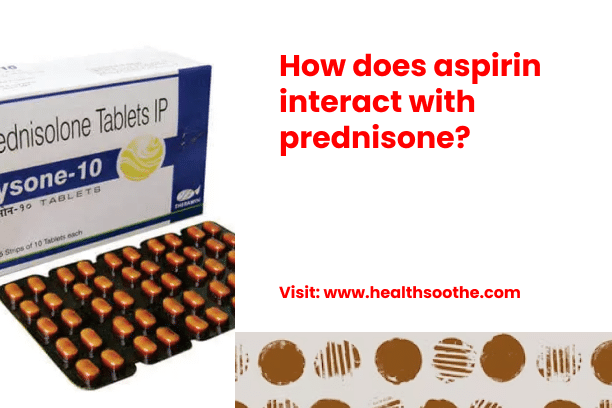This post may contain affiliate links. Read our disclosure policy.
- Prednisone:
- Interactions between your drugs
- aspirin + prednisone
- What is prednisone used for?
- Pros and Cons of aspirin and prednisone
- Pros and Cons of Aspirin:
- Pros and Cons of Prednisone:
- Differences Between aspirin and prednisone
- Aspirin:
- Prednisone
- Alternative to aspirin and prednisone
- Alternatives to Aspirin:
- Alternatives to Prednisone:
- What side effects can prednisone cause?
- Drug and food interactions
- aspirin + food
- aspirin + food
- Where should I keep my medication?
- Conclusion
Aspirin is a nonsteroidal anti-inflammatory drug (NSAID) and also has antiplatelet properties. It is primarily used to relieve pain, reduce inflammation, and lower fever. Aspirin is commonly used to treat conditions such as headaches, muscle aches, arthritis, and to prevent heart attacks and strokes by reducing the clotting tendency of blood.
Prednisone:
Prednisone is a corticosteroid medication. It works by suppressing the immune system and reducing inflammation. Prednisone is used to treat a wide range of conditions including allergic disorders, skin conditions, autoimmune diseases, asthma, and certain types of cancer. It is also used as an immunosuppressant to prevent organ rejection after transplantation.
Interactions between your drugs
aspirin + prednisone
This text describes a potential interaction between corticosteroids (such as prednisone) and salicylates (such as aspirin). Here's a breakdown of the key points:
- Interaction: When corticosteroids and salicylates are used together, the serum concentrations and therapeutic effects of salicylates may decrease. Conversely, when corticosteroid therapy is withdrawn, serum salicylate levels may increase, potentially leading to salicylate toxicity.
- Mechanisms: The interaction may occur due to increased renal clearance and/or induction of hepatic metabolism of salicylates caused by corticosteroids.
- Potential Effects: There's a risk of increased gastrointestinal (GI) toxicity, including inflammation, bleeding, ulceration, and perforation, due to additive ulcerogenic effects of these agents, especially aspirin, on the GI mucosa.
- Management:
- Patients receiving both corticosteroids and salicylates may require higher doses of salicylates.
- Close monitoring of pharmacologic response to these medications is necessary when a corticosteroid is added to or withdrawn from therapy.
- Salicylate dosage should be adjusted accordingly.
- Patients should be advised to take the medications with food and to promptly report signs and symptoms of GI ulceration and bleeding.
- Prophylactic anti-ulcer therapy, such as antacids or H2-antagonists, may be considered, especially in patients with a history of peptic ulcer disease or GI bleeding, and in elderly and debilitated patients.
Overall, healthcare professionals should be aware of this potential interaction and manage patients receiving both corticosteroids and salicylates accordingly to minimize adverse effects.
What is prednisone used for?
Prednisone, exclusively obtainable with a prescription, serves to address various ailments by diminishing inflammation and curtailing immune system responses.
Several typical conditions for which physicians prescribe prednisone encompass:
- Allergies
- Autoimmune disorders like rheumatoid arthritis
- Blood disorders
- Infections
- Certain skin conditions
- Specific cancers
- Prevention of organ rejection post-transplant
Read Also: The Process of Obtaining a Medical Marijuana Prescription Explained
Pros and Cons of aspirin and prednisone
Pros and Cons of Aspirin:
Pros:
- Pain Relief
- Anti-inflammatory
- Blood Thinning
- Fever Reduction
Cons:
- Stomach Irritation
- Bleeding Risk
- Allergic Reactions
Pros and Cons of Prednisone:
Pros:
- Anti-inflammatory
- Immunosuppressive
- Rapid Relief
- Wide Range of Uses
Cons:
- Side Effects
- Long-term Use Concerns
- Withdrawal Symptoms
- Interactions
Differences Between aspirin and prednisone
Aspirin:
Aspirin is primarily used for pain relief, reducing fever, and as an anti-inflammatory medication. It is commonly used for headaches, muscle aches, arthritis, and reducing the risk of heart attacks and strokes.
Prednisone
Prednisone is used to treat a wide range of conditions that involve inflammation and immune system dysregulation. This includes autoimmune disorders like rheumatoid arthritis, asthma, allergies, skin conditions, and certain cancers.
Alternative to aspirin and prednisone
Alternatives to Aspirin:
Other NSAIDs:
Nonsteroidal anti-inflammatory drugs (NSAIDs) like ibuprofen (Advil, Motrin) and naproxen (Aleve) can be alternatives to aspirin for pain relief and reducing inflammation. However, they also have similar side effects, such as stomach irritation and increased risk of bleeding.
Alternatives to Prednisone:
Other Corticosteroids:
There are other corticosteroids that may be prescribed as alternatives to prednisone, such as methylprednisolone (Medrol) or dexamethasone. These medications have similar anti-inflammatory and immunosuppressive effects but may differ in potency and duration of action.
What side effects can prednisone cause?
The likelihood of experiencing side effects from prednisone rises with higher doses.
Typical side effects of prednisone comprise:
- Weight gain
- Digestive issues
- Difficulty sleeping
- Restlessness
- Excessive sweating
Less frequent side effects encompass:
- Cataracts
- Elevated blood sugar levels
- Hypertension
- Heightened appetite
- Greater susceptibility to infections
- Osteoporosis
- Delayed wound healing
- Suppression of adrenal hormones
- Edema
- Fragile skin
In rare instances, severe allergic reactions to prednisone can also occur.
Drug and food interactions
aspirin + food
TRY TO AVOID: Combining aspirin or nonsteroidal anti-inflammatory drugs (NSAIDs) with alcohol can increase the risk of gastrointestinal (GI) bleeding. This might occur due to a dual local impact and the suppression of prostaglandins, which can compromise the integrity of the GI tract lining.
HOW TO HANDLE: It's important to inform patients about this possible interaction and recommend abstaining from alcohol when using aspirin or NSAIDs.
aspirin + food
A study has revealed that when caffeine and aspirin are taken together, there's a 25% rise in the rate of salicylate appearance and a 17% increase in its maximum concentration in the bloodstream. Additionally, a notably larger area under the plasma concentration time curve of salicylate was observed with the concurrent use of these drugs. However, the precise mechanism behind this interaction remains unspecified. It's crucial for physicians and patients alike to recognize that combining aspirin and caffeine may result in quicker elevation of salicylate levels.
Where should I keep my medication?
Keep away from children.
Store at room temperature, between 15 and 30 degrees Celsius (59 and 86 degrees Fahrenheit). Ensure the container is tightly closed. Discard any unused medication after the expiration date.
Note: This information sheet provides a summary and may not include all possible details. If you have any questions about this medication, consult your doctor, pharmacist, or healthcare provider.
Conclusion
The coadministration of caffeine and aspirin has been found to significantly increase the rate of appearance, maximum concentration, and overall exposure of salicylate in the bloodstream, as indicated by various studies. While the exact mechanism underlying this interaction remains unclear, healthcare professionals and patients should remain vigilant about the potential for elevated salicylate levels when combining these medications. This awareness is crucial for ensuring safe and effective medication management and underscores the importance of informed decision-making regarding drug combinations.



